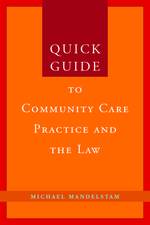 Michael Mandelstam has worked independently for thirteen years providing legal training, advice and consultancy to local authorities, the NHS and voluntary organisations. Prior to this, he worked at the Disabled Living Foundation, a national voluntary organisation, before moving to the Social Services Inspectorate at the Department of Health in the UK. He is the author of several books from Jessica Kingsley Publishers, including the new Quick Guide to Community Care Practice and the Law.
Michael Mandelstam has worked independently for thirteen years providing legal training, advice and consultancy to local authorities, the NHS and voluntary organisations. Prior to this, he worked at the Disabled Living Foundation, a national voluntary organisation, before moving to the Social Services Inspectorate at the Department of Health in the UK. He is the author of several books from Jessica Kingsley Publishers, including the new Quick Guide to Community Care Practice and the Law.
How did you first become involved in social care?
Pure accident. I started to understand a bit about it when I worked at the Disabled Living Foundation in the 1980s. Then a bit more when working within the Social Services Inspectorate at the Department of Health, during the 1990s. I had previously worked at the Kalamazoo Business Systems in Birmingham in ‘goods inwards’, which had little to do with social care. During the early 1990s I also studied law and so made the link between law and social care.
Can you tell us about your work with the Disabled Living Foundation?
I started work as a handyman in the early 1980s with responsibility for light bulbs, wheelchair tires and shelf stacking. This evolved into indexing product literature about disability equipment on the old type of ‘punch card’ system, before the advent of computers. I then was fortunate enough to be given the opportunity to develop a thesaurus of disability equipment terms for an emerging computer database. This in turn led on to a research project carried out for the European Community. It was called ‘Handynet’ and involved mapping the legal framework in the UK for the provision of disability equipment. Finally, this work culminated in three editions of How to get Equipment for Disability, published by Jessica Kingsley.
What piece of advice would you offer to busy practitioners working in community care?
It is not for me to offer busy practitioners general advice. However, I would say that the law is a useful and essential tool, (a) to make sure that people in need of assistance receive what they are entitled to, and (b) to protect practitioners and their organisations from legal cases and complaints.
What are the main changes you have witnessed in social care in the past ten years?
More rationing, more doublespeak from the Department of Health and from management in local authorities, increasing resort to meaningless mantras, more bureaucracy and statistics, threats to professional integrity, apparent withdrawal of support from many older people, and the increasing triumph of process over substance in social and health care.
What are your hopes and fears for the future of social care?
That the new policy of personalisation and self-directed support should not be not implemented crudely and with cost cutting in mind, and that it is not used as a cover for abandoning people, particularly older people, and leaving them to sink or swim. However, it is difficult to see how these pitfalls can be avoided, given the all round pressures on local authorities and given the numbers of older people and the way in which they are viewed and treated in social and health care.
What are you currently reading in your spare time?
I have recently been reading The Whisperers by Orlando Figes, an extreme reminder (it is about Stalinist Russia) of what happens when people stop thinking and when mindless and frightening bureaucracy takes over. My lighter reading at present is unfashionable: GK Chesterton’s essays called On Tremendous Trifles, and his Father Brown detective stories about a maverick Catholic priest. Finally, more modern is Hodd, by Adam Thorpe, a highly original rewriting of the Robin Hood story.
Copyright © Jessica Kingsley Publishers 2010.